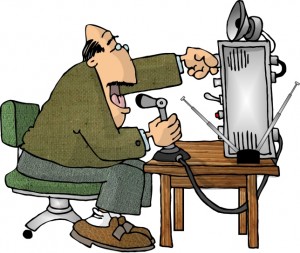The greatest sin towards our fellow creatures is not to hate them,
but to be indifferent to them;
that’s the essence of inhumanity.
—George Bernard Shaw
The most beautiful thing we can experience is the mysterious. It is the source of all true art and science.
—Albert Einstein
Does “10-4” have a familiar ring to it? No surprise there; it’s at the heart of amateur radio communication, since it means “Message Received.”
But how often do we use it—not the literal numbers, but the statement? Do we acknowledge the messages we receive?
“Oh, come on. We’re drowning in email.”
True. But just remember the last time it took forever to get a call or email returned—if it even happened. And see if you can remember how you felt about that.
Now, don’t misunderstand. I’m not talking about your marketing communications, be they ads, show notices, or any other kind of pitch.
“He never called me back!” I hear.
“And he never will,” I tell the client. Then I offer Tzena’s rule of thumb: “S/he who wants the business makes the call” (or sends the email or text). This approach always puts the ball back in your court.
Many people talk of going to events and noticing the person they’re talking with is glancing to the side—seeing if something better might be coming down the pike :>. (This is a version of what psychologist JoAnn Loulan calls “FMS,” for “’Fraid I’m Missing Something.”)
What’s that? You think that’s rude?
Well, yes. You’re right. But so is reading a message in Facebook without responding, so the other person just sees a checkmark, rather than taking a moment to say, “Got it. Thanks.” (Ignoring it entirely is beyond the pale, unless you are ill, injured, pregnant or have recently given birth, lost a loved one, are out of the country, or it’s from someone you do not know. If more than one of the above applies, you get an extension :>.)
Now remember the last time someone really listened to you, really tuned in, and how you felt afterward. (“The greatest gift we can give one another is rapt attention,” said Sue Atchley Ebaugh.) Or the last time someone gave you the benefit of the doubt.
I was really annoyed at a person I thought I had taken my seat at a crowded show.
She quietly explained that no, this was her row. I looked again and she was right!
I was in the next row. I was mortified, and apologized.
She said, “I understand.”
“No,” I said, “Really. I am so embarrassed.”
“I understand,” she said again.
“What do you do?” I asked her, and she handed me her card. I was impressed with how gracefully she had handled a situation that easily could have become unpleasant, how she had effortlessly said, “Message Received.”
Think about “message received” as you go through the day today. Is there a breach with someone that you can heal today? And in the wider world, how often do you acknowledge the teller at the bank (if you even go inside), the clerk at the store, the person on the elevator?
A man I know said one day he realized he was seeing the people walking ahead of him on the street as obstacles in his path. Ouch. (And this was before half the people were “podified”—i.e., had their ears plugged with devices. You receive some messages that way, but miss out on others—for example, the one from that crack in the street. A chiropractor I know gets a steady stream of people who trip over things while texting. Recently in San Francisco, it got even grimmer: a man was flashing a gun around on a streetcar and, deep in their screens, no one noticed until, just before exiting, he shot someone in the back of the head.)
On a brighter note, how many exciting things in your life have happened seemingly by chance? Focus is important; don’t get me wrong. But hyperfocus—the expression we often use is “on a mission”—may make us miss out. A lot of magic—what Einstein might call “the mysterious”—happens when we pay attention to the world around us.
My brother once said, “It’s amazing how many dishes other people leave.” It’s easy to take offense at the people who didn’t return our calls and messages. But it’s much more useful to focus on being the person transmitting that age-old greeting: “Message received, good buddy.”
©2013 Laynie Tzena. All Rights Reserved.





Laynie:
Funny that you’re writing this for adults (I’m assuming adults read your blog). Just a few hours ago I was reading a Winnie the Pooh book to my son entitled “No One is Listening.” In the story, Rabbit was trying to organize a party and telling what everyone should bring to the party. Problem is no one listened to Rabbit and everyone ended up bringing a tablecloth to the party, thinking that’s what Rabbit told them to bring. There was no food, no decorations, and no games. Luckily, when they all saw the tablecloths Christopher Robin explained they need to listen to Rabbit. They all turned around, got what they were supposed to get, and had a great party.
I hope my son got it. He’s only three. If he doesn’t get it by the time he’s an adult, I’ll show him this post.
Great points all. (a subject you know is near and dear) I like “message received” a lot better than the “ack” a techie friend of mine espouses (for acknowledged.)
close the loop, right? not too much to ask.
Great piece Laynie. I too have felt distressed when my carefully crafted message seemed to have dropped into a black hole. The silence has left me wondering: Did Joe not like it? Did Sue think it was obvious, stupid? Did she wish I hadn’t taken her time? Did I do something wrong? Most likely, my rational self knows, it is none of the above. Probably Joe and Sue were busy, had a surfeit of messages right then, were preoccupied, later thought they must have responded, hoped so, but, oh well, too late now. Most important, to me, is the suggestion that we “pay it forward.” Perhaps the moment of hurtful silence can serve to remind me of how much acknowledgement matters. Pass it on; one random act of courtesy can have a life beyond my imagining.